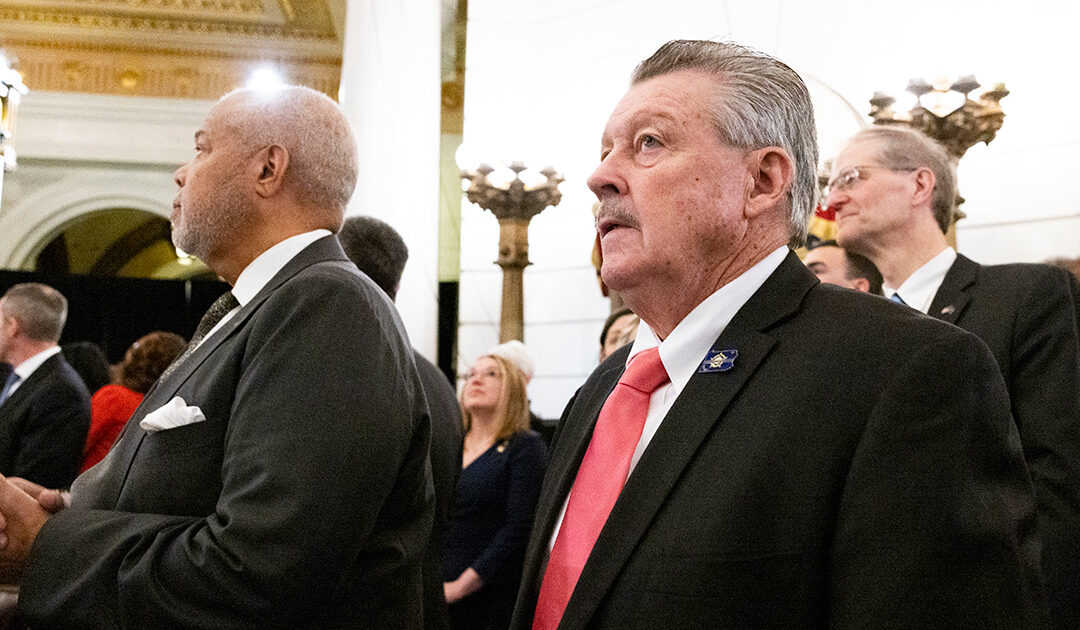
February 6, 2024
Harrisburg, February 6, 2024 – State Sen. Jim Brewster released the following statement today on Gov. Josh Shapiro’s $48 billion 2024-25 budget proposal:
“The budget that the governor outlined today carries the promise of historic progress on challenges that have for too long prevented Pennsylvania from achieving the type of security and prosperity that is possible in a commonwealth blessed with natural resources as well as a resourceful work force.
“With a proposed increase of another $1.4 billion top of last year’s record commitment to basic education, this spending plan could end years of our state languishing in the bottom tier with states who compete for 21st century jobs with a 20th century funding system.
“The governor’s proposal also helps ensure that new education dollars will not be poured into schools that are unhealthy, unsafe and unfit for service to our students. School security has been a long-held priority of mine and I’m looking forward to working with the administration to direct the funds where they are most needed and most wisely spent.
“It is also encouraging to see that the allocation of Pennsylvania’s record surplus will not end at the school grounds and will find its way into communities and local industry where efforts to provide opportunity will see new investments.
“From the hundreds of proposed new state troopers to the additional $37 million for violence prevention programs, the budget offers a blueprint for the General Assembly to help local communities deal with the scourges of violence and drug abuse.
“In his address, the governor expressed his strong support for the labor movement that made Pennsylvania and the Mon Valley an economic powerhouse in the 20th century and provides the potential for similar future partnerships which ensure that prosperity is equally allocated for all who contributed to its creation.
“There is certainly a lot to like about the direction this budget takes us, but it will take some time over the next few months to create legislation from this broad outline.
“Like the governor, it is my hope that we can do this in a bipartisan fashion that recognizes our common strengths and our common challenges.’

July 25, 2023
Harrisburg – July 25, 2023 – State Sen. Jim Brewster today called on lawmakers to return to Harrisburg to address a now-final court ruling that Pennsylvania’s education funding system is unconstitutional, unfair and inequitable.
“Since the deadline to file an appeal to the Commonwealth Court’s February ruling passed over the weekend, that ruling is now final and presents an opportunity for us to work together to fairly fund education and comply with the judge’s order,” Brewster said.
In her 800-page decision from February, Commonwealth Court President Judge Renee Cohn Jubelirer detailed the shortcomings of the current system that has created the most dramatic and draconian inequity in the nation.
“Commonwealth Court could not have been more direct in exposing that our education funding system ‘clearly, palpably, and plainly’ violates the Pennsylvania Constitution’s Education Clause,” Brewster said. “Every member of the General Assembly has taken an oath to defend the constitution and that means nothing less than sweeping reform that will end generations of inequity and lost opportunity.”
“Petitioners satisfied their burden of establishing the Education Clause was clearly, palpably, and plainly violated because of a failure to provide all students with access to a comprehensive, effective, and contemporary system of public education that will give them a meaningful opportunity to succeed academically, socially, and civically,” the judge wrote.
Brewster says that the court’s ruling is a call to action for lawmakers to create a thorough and efficient system of public education without putting more burden on Pennsylvania’s taxpayers.
“The state must come up with more to fairly fund our public schools so that taxpayers do not see increases in their property taxes,” Brewster said.
Brewster, who has become known as an advocate for public education during his time on the Senate Education Committee and the state’s School Safety and Security Committee, said the ruling gives lawmakers an opportunity to create a plan to ensure every school district has enough staff, a modern education curriculum and safe school buildings.”
“Pennsylvania is in a sound financial position and there is opportunity to do what we are sworn to do,” Brewster said. “It is time for us to return to Harrisburg to get this done.”
The Court’s entire ruling from February can be read here.
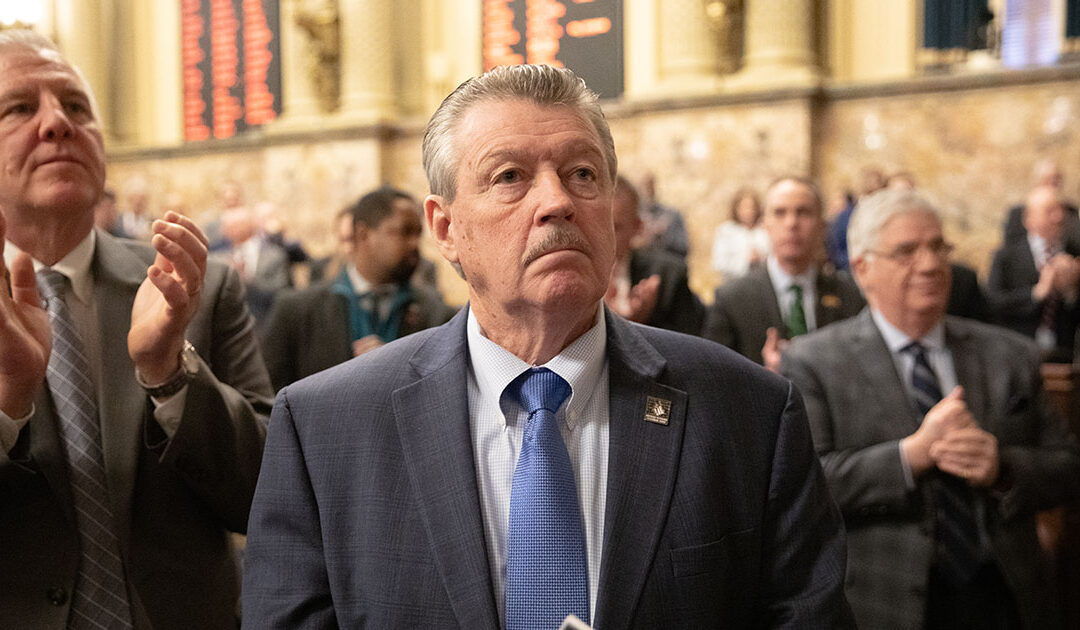
March 7, 2023
State Sen. Jim Brewster issued the following statement today on Gov. Shapiro’s inaugural budget address:
The governor’s budget provides a solid framework for building upon recent improvements to education, public safety, and the environment. I’m looking forward to working with the administration to fill out the framework with the details that will help communities thrive and keep our neighbors safe and healthy.
Pennsylvania’s economy has provided revenue that will in turn provide opportunity to address long-term and systemic neglect of our public education system, a system that has been declared unconstitutional in its inequity.
At the same time, I applaud the governor for outlining a way to change the way we fund the State Police to create sustainable long-term investments in public safety through the expansion and continued improvements to training and equipping our troopers.
From improvements to childcare to expansion of the Property Tax and Rent Rebate Program, the budget should lift Pennsylvanians of all ages in all regions. It is a thoughtful and balanced approach to governing and I’m looking forward to filling in the details over the next several months. For more details on the budget visit pasenate.com/budget.
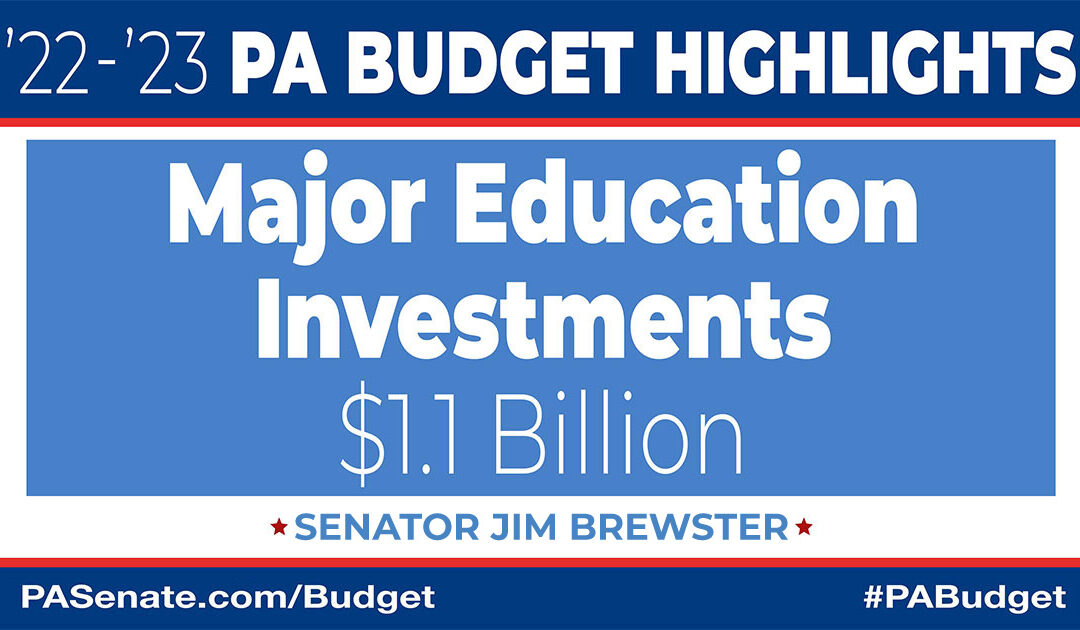
July 11, 2022
Harrisburg, July 11, 2022 – With a record state investment in violence prevention spending in the new budget, state Sen. Jim Brewster announced today that he has been re-appointed to the School Safety and Security Committee, the chief conduit for intervention programs in the state.
“We’re at a critical time for public safety after a surge in violence that accompanied the pandemic,” Brewster said. “The School Safety and Security Committee played a central role in reviewing and assessing intervention and prevention efforts and steering state funds where it can be most effective.”
The 17-member committee was created through Act 44 of 2018 with a goal to craft policies and provide grants to curb school and community violence. The committee works under the auspices of the Pennsylvania Commission on Crime and Delinquency (PCCD).
In July 2019 Senator Brewster sent a letter to the committee asking them to establish baseline standards of safety for every school in the Commonwealth to keep students, teachers, and administrators safe. Specifically, he asked for them to establish physical baselines, including items such as door locks and cameras; mental health baselines, including school counselors and psychologists; and environmental baselines, including air quality monitors and lead/mold abatement.
“During my time on the School Safety Committee, I have been advocating for establishing baseline criteria to ensure we are best utilizing money,” Brewster said. “I am thrilled to see that for the first time the funds will be prioritized to get all schools to baseline.”
Last year, the state committed a record $30 million to the school safety effort, and this year’s state budget more than triples that amount to $105 million with the help of America Rescue Plan funds.
“To reduce community violence, we need to address the core causes,” Brewster said. “Poverty, mental health, and addiction are serious drivers of crime in our communities, and this committee is investing additional funds to address these issues.”
In awarding grants last year, Brewster said the committee took a broad approach to what it perceived as a complex issue with a wide range of causes. The committee funded the efforts of large academic institutions that study the problem from a data-driven level, as well as small, grassroots efforts with budgets in the thousands and feet on the street.
As a senator, Brewster has been at the forefront on school safety issues. His appointment was made by Senate Democratic Leader Jay Costa.
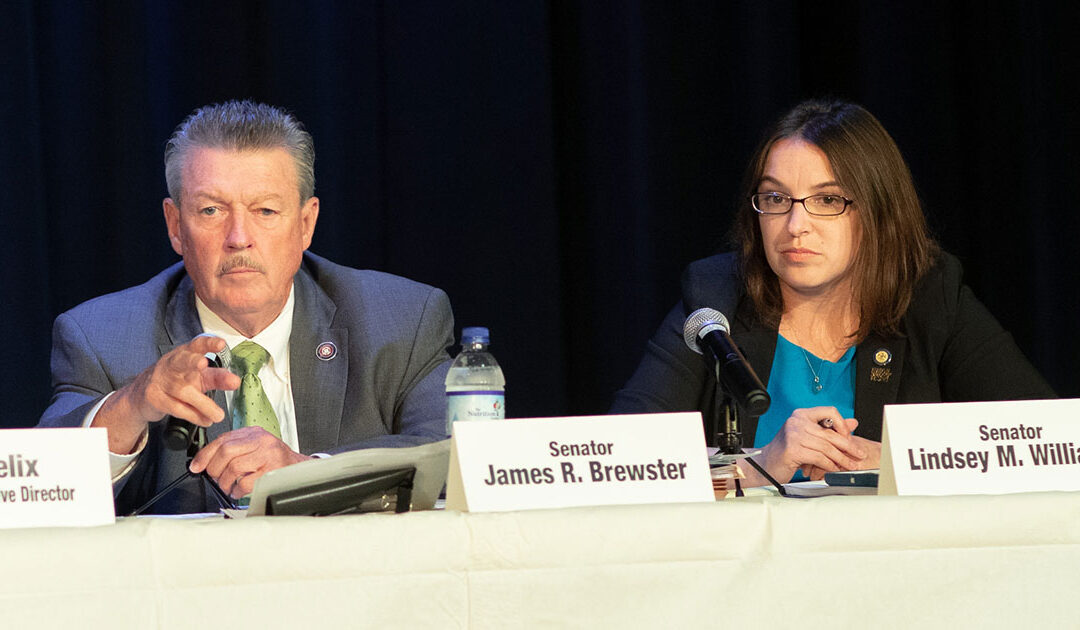
June 16, 2022
Harrisburg − June 15, 2022 − Senator Jim Brewster announced today that he is the prime co-sponsor of legislation aimed at improving student mental health. This bill seeks to put more school-based mental health care programs and professionals into classrooms.
Senator Brewster and Senator Williams are co-sponsoring SB 1285, which will focus the majority of grants awarded through the Pennsylvania Commission on Crime and Delinquency’s School Safety and Security program for the 2022-23 school year on funding applications for projects that support students’ behavioral and mental health.
“As a member of Pennsylvania’s School Safety and Security Committee, I have been a leading advocate for more resources for mental health services in our schools,” Brewster said. “This legislation will direct a majority of funding for 2022-2023 to school districts for additional mental and behavioral health programming.”
This legislation is modeled after a similar step that the General Assembly took in 2020, when it temporarily focused these grants on responding to the COVID-19 pandemic.
“Even before the pandemic, students have been telling us that there is a growing youth mental heath crisis,” said Senator Williams. “Safe2Say reports let us know that bullying, suicide, and self-harm are three of the biggest problems facing our students right now, and it’s time for the General Assembly to take action to address these. We’ve talked about how the pandemic has caused a mental health crisis in our students for over two years—it’s long past time we start taking action to fund the services that can provide immediate assistance to those students.”
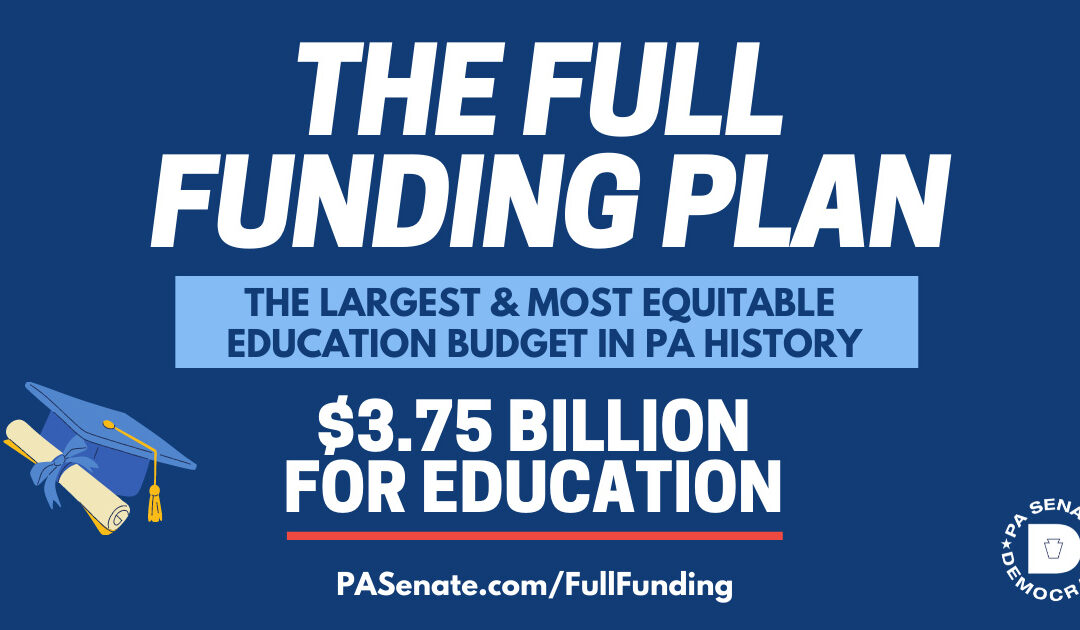
January 31, 2022
Harrisburg, January 31, 2022 – State Sen. Jim Brewster today stood with colleagues in the House and Senate to announce a school budget plan that would represent the largest investment in public education in Pennsylvania history.
The $3.75 billion outline, dubbed the Full Funding Plan, would take advantage of an expected $6 billion year-end state revenue balance to address generational inequity, crumbling school infrastructure and staffing problems exacerbated by the pandemic.
Brewster, who sits on the PA Senate Education Committee and the PA Commission on Crime and Delinquency’s School Safety and Security Committee, said inadequate school funding and disinvestment in struggling communities are at the root of numerous costly social problems.
“We can’t effectively address crime or violence without investing in struggling schools and closing the opportunity gap in education,” he said. “In many neighborhoods the school is the safe haven and the resource of first choice for disadvantaged families. This plan is an opportunity to truly create the ‘thorough and efficient’ system of public education that our constitution requires.”
The plan would make significant additional investments in the following areas:
- $1.1 billion into the Fair Funding Formula
- $750 million into Level Up (targets 200 districts with the most inequitable funding, and largest adequacy gap)
- $1.1 billion into school facilities
- $250 million into historic staffing problems
- $125 million into mental health supports
- $100 million into academic supports
“We are confident in the sustainability of this plan because Pennsylvania is experiencing an unprecedented revenue surplus due to a huge economic turnaround aided by federal investments,” said State Sen. Vincent Hughes, Democratic Chair of the Senate Appropriations Committee. “There can be no more excuses for toxic schools and inequality of opportunity. We are sitting on the largest pool of unspent funds in Pennsylvania history.”
Hughes said state revenues are on track to outperform estimates by well over $2 billion, while nearly $2.2 billion of American Rescue Plan funds remain unused.
“The time is now. The time is right,” said Sen. Jay Costa, the Democratic Leader. “The resources are there, and its incumbent upon all of us to really make a significant statement on the steps we need to take to adequately fund public education.”
Pennsylvania’s strong revenues combined with federal assistance will result in a year-end balance of well over $6 billion.

June 25, 2021
HARRISBURG, June 25, 2021 – With help for pandemic-stricken Pennsylvanians falling far short of needs, state Sen. Jim Brewster said today he voted to approve Pennsylvania’s state budget because it meets one of his priorities: getting help to struggling Pennsylvanians immediately.
“It’s disappointing to me that we would stash money in a vault when it’s needed out on Main Street,” Brewster said. “The pandemic left small businesses, schools, and essential workers struggling to stay afloat and the majority in Harrisburg wants to keep the life preservers on the boat. I don’t get it.”
At the same time, Brewster said, a long budget impasse could be even worse.
“We’ve said all along that we wanted to send relief immediately and that will happen,” he said. “But we will continue to talk with those who are struggling to find ways to loosen Harrisburg’s grip on federal stimulus funds that rightfully belong to those hurt by the pandemic. This isn’t over.”
The budget takes steps toward fair funding for schools but falls short of the goals Brewster and other Democrats had laid out for a $3 billion surplus and $7 billion federal stimulus. Much of that funding is set aside for future needs in the budget agreement passed late Friday.
“I will continue to fight for more money, fairly distributed, for schools, businesses and vulnerable individuals,” Brewster said. “As we move forward, tangible results from these investments will be the best argument for additional resources.”
Setting aside $2.5 billion in the Rainy Day Fund, and reserving most of the federal stimulus for future use, the spending plan contains no tax increases and injects $300 million in additional funds for K-12 education.
Brewster said the $200 million over four years for higher education does not provide adequate resources to avoid cuts and consolidation for the Pennsylvania State System of Higher Education, but the surplus set aside means students, faculty and residents of affected communities still have an opportunity to make their voices heard.
“No one can say there’s no money to help our state schools,” Brewster said. “We can still let the General Assembly know that value-oriented college education is a priority that deserves consideration when there is money stashed away in a vault.”
Increased education line items this year include:
- $300 million in basic education
- $200 funded through the Fair Funding Formula
- $100 million for Level Up, a new effort provide funding for schools that have been historically underfunded
- $20 million for Ready to Learn block grants
- $25 million for Pre K Counts
- $5 million for Headstart
- $50 million for special education
- $11 million for early intervention
- $200 million for PASSHE, over 4 years, including funding for the Diversity, Education & Inclusion program proposed by Senate Democrats.
“The work doesn’t end because at the constitutional deadline to pass a budget,” Brewster said. “Allies in the General Assembly and advocates across the state are gearing up for continued effort to expand educational opportunities for all students at all levels. We’ve taken some steps but there’s a long way to go.”

September 4, 2020
McKeesport – Sept. 4, 2020 – Decisions on whether to restart interscholastic fall sports should be left to local school district officials, state Sen. Jim Brewster (D-Allegheny/Westmoreland) said today following his vote in support a bill that would leave it to school boards to decide.
“The legislation makes it clear that local school boards will make that decision — as long as health and safety protocols are in place,” Brewster said.
Brewster voted for House Bill 2787 in the Senate Education Committee on Friday for the second time following a reconsideration of Thursday’s vote. The committee voted 10 to 1 in favor of the bill, which will now be reported to the full Senate.
“The legislation enjoys strong and wide support and should be quickly passed by the full Senate,” Brewster said. “We need to give local officials discretion to make decisions once safety protections are established.”
Brewster serves on the statewide School Safety and Security Committee. In June, the committee recommended a framework to distribute more than $150 million in federal pandemic relief funds to school districts across the state. The funding was earmarked to help schools deal with COVID-19 expenses.
“We have distributed funding to local schools to help defray costs, but more needs to be done,” Brewster said. “These funds and the approval of bills to give local school districts discretion on reopening strategies and school sports are key aspects of the recovery.”
Brewster said school directors get input each day from parents, school administrators and others on reopening school sports and are well positioned to make that decision.
The McKeesport lawmaker has been recognized as a leader on boosting the economy and safely reopening in the wake of the coronavirus pandemic.
In March, Brewster offered a six-point economic stimulus plan to quickly regain jobs and spur a quick recovery from COVID-19. In April, he detailed a health and safety strategy to ensure that a rapid, but safe reopening, featuring more testing and protections for workers.

May 28, 2020
Harrisburg – May 28, 2020 – Sen. Jim Brewster (D-Allegheny/Westmoreland) said today that the Senate has passed legislation (House Bill 1210) to drive out nearly $215 million to help school districts pay for costs associated with protecting children, cleaning buildings and modifying structures in response to the COVID-19 pandemic.
“This is a necessary infusion of cash to help school districts protect children and adjust the footprint of facilities in response to the COVID-19 pandemic,” Brewster said. “School districts need additional funds to clean buildings, make social distancing modifications and purchase necessary equipment.”
Brewster said that nearly $200 million will be earmarked for school entities. Each school district will receive at least $120,000, plus the districts will receive additional funds based on average daily enrollment of school districts — an additional $114 million will be available for distribution on a pro rata basis. Career and technical schools, intermediate units and other schools will receive an allocation of $90,000.
The COVID-19 Disaster Emergency School Health and Safety Grants were previously known as the School Safety and Security Grant Program. Brewster has served as a member of the School Safety and Security Committee distributing grants to school districts since its inception.
The funding provided to school districts can be used for:
- Purchasing of cleaning and sanitizing products that meet Center for Disease Control (CDC) or Department of Health criteria;
- Training and professional development of staff on sanitation and minimizing the spread of infectious disease;
- Purchase of equipment, including personal protective equipment, thermometers, infrared cameras and other necessary items;
- Modification of existing areas to effectuate appropriate social distancing to ensure the health and safety of students and staff;
- Providing mental health services and supports, including trauma-informed education programs for students impacted by the COVID-19 disaster declaration;
- Purchasing education technology for distance learning to ensure the continuity of education; and,
- Other health and safety programs, items or services necessary to address the COVID-19 disaster emergency.
Brewster said that $150 million of the total funds to be distributed will come from federal CARES Act funding. He said that in addition to the distribution to school districts, another $7.5 million will be used for community violence prevention grants. There will also be $7.5 million available for intermediate units to address COVID-19 issues.
The bill returns to the state House for its consideration.

August 29, 2019
Harrisburg – Aug. 29, 2019 – The statewide School Safety and Security Committee has endorsed state Sen. Jim Brewster’s (D-Allegheny/Westmoreland) plan to create a subcommittee to explore the development of baseline safety and security standards applicable to all schools.
“To ensure the safety and security of our students and all who go into public schools, it is critical that schools’ baseline safety standards be in place,” Brewster said. “A detailed safety and security plan with a focus on a school’s physical plan, accessibility to mental health services and environmental protections is necessary.”
Recommendations produced by the subcommittee will be sent to the full School Safety and Security Committee for approval, Brewster said.
Earlier this year, Brewster sent a letter to the members of the School Safety and Security Committee asking that they consider his proposal. Brewster, who serves on the committee, has sponsored Senate Bill 788, which would create baseline standards by statute.
Brewster said he asked the committee to act on his idea to expedite work on developing the standards.
“All school districts should have state resources available to adhere to easily understandable and clear baseline standards regarding the physical structure of schools, access to mental health professionals for counseling, and protection from environmental problems such as lead, mold and other health threats,” Brewster said. “Our efforts are centered on protecting students, teachers, administrators and parents who are in our school buildings and on campus.”
The McKeesport lawmaker said the state budget has included $60 million installments for each of the last two years for school safety. This funding can be applied to helping school districts comply with baseline requirements developed by the subcommittee, he said.
The School Safety and Security Committee was established by statute in 2018 and is administered by the Pennsylvania Commission on Crime and Delinquency.
Brewster said he is grateful that the committee acted on his request and pleased that it made his proposal a priority.

January 18, 2019
Harrisburg, Jan. 17, 2019 – Education grants dedicated to the implementation and improvement of computer science programs and career-readiness have been awarded to schools in Allegheny and Westmoreland counties, said Sen. Jim Brewster (D-Allegheny/Westmoreland).
“As computer technology continues to evolve, it is important that students can experience and learn new computer skills first hand,” Brewster said. “I am pleased that students in our area will benefit from Pennsylvania’s grants dedicated to improving computer science programs in local schools.”
Baldwin-Whitehall, Duquesne, East Allegheny and South Allegheny in Allegheny County, along with Burrell and Kiski school districts in Westmoreland, were approved for funding through the PAsmart initiative. The grants are for $35,000 each.
PAsmart grants are used to fund high-quality STEM and computer science courses for K-12 students, specifically those in low-income areas where access to up-to-date STEM technology may be limited.
Brewster noted that the state’s commitment to funding innovative technology and STEM education for Pennsylvania students has resulted in the state ranking second in the country for STEM education funding.
“PAsmart grants are an excellent investment in the future of our students,” Brewster said. “We must continue to provide for educational programs and opportunities that will prepare students to enter the ever-changing, fast paced workforce.”
A total of $8.7 million were distributed to 221 school districts for 765 individual schools.
-30-
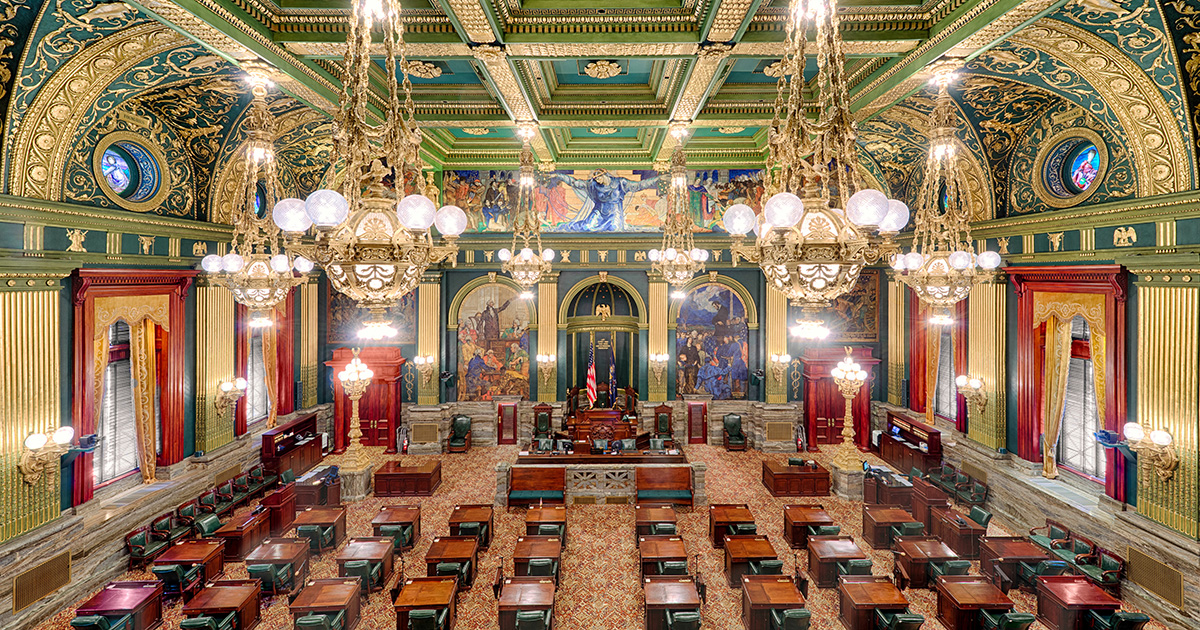
January 16, 2019
Veteran lawmaker also appointed to seats on Banking and Insurance, Education and Transportation
Harrisburg – January 16, 2019 – State Sen. Jim Brewster (D-Allegheny/Westmoreland) has been appointed Democratic chair of the Senate Law and Justice and Game and Fisheries committees.
“Serving as chair on both Law and Justice and Game and Fisheries is an honor and privilege,” Brewster said. “There are significant issues to be discussed and key decisions will have to be made about modernizing our liquor system and redefining game and fishing rules and regulations.”
Brewster also served as Democratic chair of both committees in the last two-year legislative session.
The veteran lawmaker was also reappointed to seats on the Senate’s Banking and Insurance, Education and Transportation committees.
“As a member of key committees that handle issues that are important to my district, I can ensure that the needs of our region are served well,” Brewster said.
On education, Brewster has led the effort to reform charter schools. He has fought for additional dollars for education and plans to reintroduce his “Extraction for Education” severance tax plan that will provide dollars not only to bolster basic education, but also to fund school safety initiatives.
Brewster was appointed as an inaugural member of the statewide School Safety and Security Committee established under Act 44 in 2018.
“There are key problems in education that need to be fixed,” Brewster said. “I’ve sponsored bills to reform charter schools, aid school safety initiatives and ensure that we have more resources for our children to learn.”
The McKeesport lawmaker said his appointment to the Transportation Committee will ensure that issues that arise relative to the construction of the Mon-Fayette Expressway and mass transit will be addressed. Brewster has long been an advocate of the Mon-Fayette Expressway and rapid expansion of mass transit into underserved areas. He currently serves as secretary of the Port Authority of Allegheny County Board of Directors.
“Building and expanding the reach of transportation systems that serve eastern Allegheny and western Westmoreland counties, plus meeting the unique needs of the Mon and Allegheny Valleys continues to be a priority,” Brewster said.
Prior to his election to the Senate, Brewster served as mayor of McKeesport, and was formerly Vice-President of Operations at Mellon Bank in Pittsburgh.
Brewster said his appointment to a seat on the Banking and Insurance Committee provides an opportunity to utilize his expertise and experience in banking to have significant impact on crafting better banking laws.
Brewster said his legislative agenda is chalk full of important initiatives. In addition to his charter school reform package and severance tax piece, Brewster has advocated changing game laws to allow hunting on Sundays and more financial support for the Game Commission. He has introduced a far-reaching plan to address the opioid crisis, including mandatory treatment for those addicted.
In addition, Brewster has prime sponsored legislation to promote the use of American made steel in Marcellus Shale drilling and improve pipeline safety. Several years ago, Brewster spearheaded a study of the country of origin for steel pipe used in drilling.
He said he will introduce legislation to invest new dollars in environmental protection and school safety.
-30-

January 16, 2019
Harrisburg – January 16, 2019 – Education Partnership Grants to improve technical career training have been approved for projects in Allegheny and Westmoreland counties, said Sen. Jim Brewster (D-Allegheny/Westmoreland).
Westmoreland/Fayette Business Education Partnership and Three Rivers were approved for grant funding to help implement programs that will demonstrate the importance of technical careers to students and help those interested in technical careers prepare for post-secondary education and apprenticeship opportunities.
“STEM and technical careers are essential to our local and state economy,” Brewster said. “It is important that we continue to fund education programs that offer students pathways into these career fields.”
Westmoreland/Fayette Business Education Partnership was awarded $127,050 to develop technology projects and interactive programs that will allow students to explore and prepare for post-secondary education and careers within the STEM field. The programs, which will serve 600 K-12 students in the Westmoreland and Fayette area, will include both classroom and work-based learning opportunities.
Three Rivers in Allegheny was awarded $115,641 to implement a three-phase conference and networking program that will showcase careers in the building and construction industry.
“Providing students with the opportunity to explore more careers and the chance to gain hands-on experience is a great educational investment,” Brewster said. “I am happy that these local programs have been awarded the funds to help students see more options available to them in their future.”
-30-

March 28, 2018
Harrisburg – March 27, 2018 – Hundreds of millions of dollars per year are committed to school construction and rehabilitation projects in Pennsylvania; and if Sen. Jim Brewster’s (D-Allegheny/Westmoreland) new legislation is approved, there would be no state reimbursement for buildings that are not equipped with state-of-the-art school safety features.
“Given the tragic school shootings, we have to explore all ways of improving school safety and keeping our children safe,” Brewster said. “New or refurbished school buildings must be equipped with state-of-the-art safety features to prevent trespass, stop assailants and secure space for children.”
Brewster’s legislation would prohibit state reimbursement for any school building construction or rehabilitation through Pennsylvania’s “PlanCon” process unless baseline safety elements are included in the plans. PlanCon is the acronym for the state’s Planning and Construction Workbook where school districts are reimbursed for approved school construction projects.
Brewster said the installation of safety stops, emergency lights and panic buttons, impenetrable strong glass, secure access points and surveillance cameras should be part of a “school security blanket.”
“Specific baseline school safety features would be approved through a statewide school safety panel so that experts would have the opportunity to express their ideas about best practices,” Brewster said.
The western Pennsylvania lawmaker is sponsoring legislation to create an 11-member commission that would be responsible for recommending new policies and procedures to protect students. He said recommendations related to school building safety is a perfect example of why a statewide commission is necessary.
“School districts are working exceptionally hard to protect students, but new, sophisticated threats require a fresh approach to school building safety,” Brewster said. “Taxpayers, students, teachers and administrators should be confident that a school building is protected from external and internal threats.”
Brewster said his proposal is a commonsense idea that can be quickly and easily implemented. He expects to introduce the measure within the next several weeks.
-30-
July 9, 2017
Harrisburg – July 9, 2017 – State Sen. Jim Brewster (D-Allegheny/Westmoreland) said today that the legislation he offered to change the composition of the Municipal Police Officers’ Education and Training Commission is long overdue and is a common-sense change that will improve the operation of the commission.
The measure, Senate Bill 403, passed the Senate unanimously.
The bill removes the membership of a special agent-in-charge from the Federal Bureau of Investigation (FBI) with an appointee from the Pennsylvania Lodge Fraternal Order of Police (FOP). The FBI seat on the commission has been vacant since 2007.
“The FBI seat on the commission has been vacant for many years,” Brewster said. “The Department of Justice advised against making an appointment because they were concerned about a supervisory role as it relates to local police.”
Brewster served for many years as mayor of McKeesport. He was heavily involved in police training and said an additional FOP member will provide additional expertise and insight.
The legislation now awaits action in the state House of Representatives.
-30-
February 7, 2017
Plan calls for $2 billion in cuts, additional investment in education
Harrisburg – February 7, 2017 – State Sen. Jim Brewster (D-Allegheny/Westmoreland) released the following statement concerning Gov. Tom Wolf’s proposed budget for Fiscal Year 2017-18:
“The proposed $32.3 billion General Fund budget cuts more than $2 billion in expenses, calls for spending slightly more than 1 percent over last year and deals with a looming $3 billion deficit without a broad-based income tax hike.
“The governor has outlined a spending plan that cuts billions in expenses, increases spending slightly and leans heavily on agency efficiencies and consolidations of state agencies. Facing a $3 billion budget deficit if no actions were taken, the governor decided to go in a new direction. It is a new approach and reinvention of how we view government.
“The proposed budget makes investments in education, job creation and opioid treatment while maintaining social service programs to help our most vulnerable. As a blueprint and a starting point, the proposed plan touches all the bases and checks all the boxes.
“Job creation, health care, property tax relief and education are priorities. It will be critical that we identify how the proposed spending plan deals with these issues during the three weeks of upcoming budget hearings before the Senate Appropriations Committee.
“As a member of the committee, I will review this plan carefully to ensure that the needs of my district are addressed.”
-30-
October 28, 2015
Harrisburg – October 28, 2015 – At the request of state Sen. Vince Hughes (D-Phila.), the Senate Democratic Policy Committee today held a hearing on the devastating impact that the state’s 120-day budget impasse is having on schools across the state.
“While many of the budget dispute points remain unresolved, what is clear is that the consequences of this impasse are far-reaching,” said Sen. Lisa Boscola (D-Northampton), who chairs the committee. “This hearing gives lawmakers a sense of how schools are handling the funding shortfall, and what problems they’ll face if this stalemate continues to drag on.”
Hughes added, “A growing number of schools have been cornered into borrowing money and taking out credit lines just to keep their doors open. Hopefully, this hearing’s focus on this worsening statewide financial crisis will encourage greater urgency, cooperation and compromise in the ongoing budget negotiations.”
During the hearing, state Auditor General Eugene DePasquale testified that at least 27 school districts have taken out loans totaling more than $431 million. He projected that interest payments will total $30 million if the stalemate reaches mid-November.
Those who testified decried how the impasse has harmed students, depleted reserves and how taxpayers will be needlessly saddled with paying the interest on the growing number of loans and credit lines that schools are obtaining to keep their doors open.
Erie Public Schools Superintendent Jay Badams lamented that his district will need to borrow $30 million just to get through January.
“That’s $114,000 in wasted interest money that could have been used for so many badly needed educational expenses,” Badams said.
Dr. Joseph Roy, who serves as superintendent of the Bethlehem Area School District in Northampton County, added that “choices at the state level continue to hammer school districts.” He said the diversion of funds to charter and cyber schools and a “punitive” approach to public education has blown up school expenditures.
Dr. Rula Skezas, who serves as superintendent of the McKeesport Area School District in Allegheny County, noted that even if the district receives its proposed funding it would still fall short of what it received during the 2011 school year. She said McKeesport has taken out a $5 million line of credit to make it to December. She said the district has already eliminated 110 staff positions to try and make ends meet.
Hughes, who serves as Democratic chair of the Appropriations Committee, said public, charter and private schools are already reeling from years of being underfunded. He noted that the Philadelphia School District has already borrowed $275 million during the impasse. Fran Burns, who serves as chief operating officer for the School District of Philadelphia, testified that the district has struggled to contend with a “structural deficit.”
Lamenting the impact on local working families who fund schools through property taxes, Boscola pointed toward an educational survey conducted earlier this year showing that nearly 75 percent of districts were planning to impose property tax hikes, 30 percent were planning on making additional program cuts, and 41 percent were making more staff cuts. She said the state has withheld approximately $3 billion in school funds since the budget impasse began in July.
Joining Boscola and Hughes at the Capitol committee hearing were Senators John Blake (D-Lackawanna), Jim Brewster (D-Allegheny), Andrew Dinniman (D-Montgomery), Christine Tartaglione (D-Phila.) and Sean Wiley (D-Erie),
Those testifying included:
- The Honorable Eugene DePasquale
Pennsylvania Auditor General
- Fran Burns
Chief Operating Officer, School District of Philadelphia
- Joseph Gorham
Superintendent of Schools, Carbondale Area School District
- Dr. Joseph Roy
Superintendent of Schools, Bethlehem Area School District
- Dr. Jay D. Badams
Superintendent, Erie Public Schools
- Dr. Rula S. Skezas
Superintendent, McKeesport Area School District
- Marjorie Neff
Chair, School Reform Commission
- Anthony Pirrello
CEO, Montessori Regional Charter School of Erie, and Vice President of Pennsylvania Coalition of Public Charter Schools
- Matt Przywara
Member, PASBO
Chief Financial and Operations Officer, School District of Lancaster
- Bill LaCoff
President, Pennsylvania School Boards Association
- Susan Gobreski
Education Voters of Pennsylvania
- Dr. Pearl English
School Nurse, School District of Philadelphia
# # #
July 21, 2015
Shale tax devoted to education; retains local government share
Harrisburg – July 21, 2015 – As Pennsylvania continues operating without a General Fund spending plan, state Sen. Jim Brewster (D-Allegheny/Westmoreland) said today that his “Extraction for Education” proposal could help move talks forward and bring closure to key budget issues: enhanced education funding and a new Marcellus Shale extraction tax.
In late June, the Republicans passed a $30.2 billion plan without input from Gov. Wolf or legislative Democrats. Wolf vetoed the proposal. The Republican plan did not include a new shale extraction tax and would have provided little new money for education.
Brewster said both sides need to come together and work on a dedicated education funding plan via a shale extraction tax. His plan, he said, could help lay the foundation for a comprehensive budget solution because it would smooth over differences on key issues.
“My plan would place a responsible Marcellus Shale extraction tax layered over the current Act 13 impact fee,” Brewster said. “The effective rate of the levy is 5 percent, which is reasonable and clearly in line with energy extraction taxes in other states.
“New tax revenues generated as a part of my plan would be entirely dedicated to education funding.”
Brewster’s “Extraction for Education” plan (Senate Bill 395) would cap the total severance tax levy and make the effective rate 5 percent. Under the plan, impact fee expenses (Act 13) would be credited against a shale driller’s extraction tax liability.
Brewster said that education funding, a reasonable extraction tax, property tax relief and covering a $1.3 billion structural deficit are critical budget issues that remain unresolved.
In March, Gov. Tom Wolf proposed a bold funding plan that would reverse the $1 billion in education cuts over the last four years. His budget proposal also calls for property tax relief and significant increases in education funding.
Brewster said a 5 percent energy tax may generate an estimated $700 million depending on the price of gas. His plan specifically calls for the new revenues from the tax to be combined with additional state funding and distributed via the new basic education subsidy formula that was developed by the Basic Education Funding Commission.
“Shale drillers have a responsibility to pay a reasonable tax for reaping a Pennsylvania resource,” Brewster said. “Under my plan they can be assured of a specific rate and their revenues would be used specifically to help school students and taxpayers.”
The lawmaker added that it is critical that a new energy extraction tax be levied at a rate that ensures market competitiveness. Brewster was in private business for more than 20 years prior to his election to the Senate, rising to vice president of Mellon Bank in Pittsburgh.
“I’ve put my years of experience in private business and banking to use in helping me craft the approach so that it is balanced,” Brewster said. “My plan is fair to the industry and the citizens of Pennsylvania.
“All funds that are generated will be used to help schools, taxpayers and children and not be used for anything else,” Brewster said. “The relationship between the shale extraction tax and education must be clear.”
Brewster said he is hopeful that Republican leadership will join with Gov. Wolf and Democratic lawmakers in forming a budget that prioritizes property tax relief, school funding and job creation.
-30-
December 17, 2014
Harrisburg – Dec. 17, 2014 – To better manage the cost of higher education and cut tax liability this year, state Sen. Jim Brewster (D-Allegheny/Westmoreland) today reminded students and parents that contributions to an approved college savings plan by Dec. 31 are tax deductable.
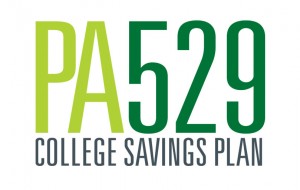 “The high cost of a college education is a real challenge for students and parents,” Brewster said. “A 529 plan helps families manage costs and provides a means to reduce tax obligations.”
“The high cost of a college education is a real challenge for students and parents,” Brewster said. “A 529 plan helps families manage costs and provides a means to reduce tax obligations.”
Brewster noted that state Treasurer Rob McCord’s office is offering free enrollment in the PA Guaranteed Savings Plan and the PA 529 Investment Plan.
“There are a great many resources available to help students, parents and families deal with the high cost of college,” Brewster said. “Establishing a PA 529 plan and making contributions is an excellent way for families to both save for college and lower tax bills at the same time.”
The treasurer reported that there are now nearly 200,000 accounts with more than $3.3 billion in assets that are being managed by his office.
Taxpayers can deduct up to $14,000 per beneficiary in PA 529 contributions from Pennsylvania taxable income on their state tax returns for 2014. Married couples filing jointly can deduct up to $28,000 per beneficiary if each spouse has taxable income of at least the amount deducted.
The PA 529 College Savings Program is offering free enrollment ($50 savings) for all new PA 529 Guaranteed Savings Plan (GSP) accounts opened by Dec. 31.
Brewster said that if students, parents, guardians or others need more information or want to enroll, they can visit www.PA529.com. To take advantage of the $50 savings, use enrollment code Brewster when prompted.
-30-
December 16, 2014
Proposal features shale tax levy, education trust fund, fee credit
Harrisburg – Dec. 16, 2014 – State Sen. Jim Brewster (D-Allegheny/Westmoreland) will soon introduce a plan that would earmark revenue from a new shale gas extraction tax for public schools while retaining current well impact fees that support local government operations.
“My ‘Extraction for Education’ proposal is simple, reasonable and credible because it uses the proceeds of an extraction tax to support education,” Brewster said. “Yet it also retains funds that are currently generated from impact fees for use by local and state government. Pennsylvania taxpayers, school children, teachers and others who are involved in the education community have paid a high price because the Corbett administration has failed to embrace a responsible shale gas extraction tax.”
Brewster said a 5 percent levy would generate between $700 million to $1 billion. His plan calls for distributing this revenue via a new basic education subsidy formula that is now being developed by a bipartisan legislative commission.
Under the plan, shale drillers would be able to credit current impact fee expenses (Act 13) against their severance tax liability. That way, the senator said the effective tax rate is 5 percent, which would keep the industry competitive. The current impact fee equates to an estimated 1.8 percent tax over the life of the well, he added.
“It is important that energy companies pay a reasonable tax for a Pennsylvania resource, but we also need to balance well fees and market competitiveness so we don’t harm the industry,” Brewster said.
Brewster said he was encouraged that Gov.-elect Tom Wolf campaigned on using a robust shale tax to fund education. He said the governor elect’s support for a responsible shale tax is critical. The lawmaker said he hopes his plan will be the basis for further legislative discussions.
Targeting new dollars for education is important because Gov. Tom Corbett and his administration cut $1 billion from schools, Brewster noted. School districts have never recovered from the funding reduction and homeowners have seen their property taxes rise. Approximately 75 percent of school districts have raised taxes as a result of the underfunding of schools in Pennsylvania.
According to figures cited by the Pennsylvania Public Utility Commission – the state agency responsible for collection and distribution of the state’s current impact fee — more than $200 million was generated from impact fees (Act 13) every year since 2011. A portion of the funds collected from the well impact fee are distributed to local municipalities to cover the impact of drilling in their communities.
Under the Brewster proposal, all revenues from his proposed extraction tax would be placed in the “Extraction for Education Fund” and all dollars would be spent in support of education.
“All funding earmarked for the Extraction for Education Fund will be used to help schools, taxpayers and children and not siphoned off for other purposes,” Brewster said. “We have to make the connection between the extraction tax and education clear.”
In 2011, Brewster authored legislation linking an extraction fee to education support (SB 1286). However, the bill was never acted on by the Senate.
-30-
February 4, 2014
Harrisburg – February 4, 2014 – State Sen. Jim Brewster said today that Gov. Tom Corbett’s proposed $29.4 billion budget for Fiscal Year 2014-15 falls short of the mark on education, jobs, human services funding and health care.
“I am very disappointed that the governor did not include a sustainable and responsible funding plan for schools so we can address the huge disparity that we now face as a result of his $1 billion in cuts,” Brewster (D-McKeesport) said. “The governor also failed to include a real investment plan for job creation or human services that would help reverse the negative spiral that Pennsylvania is now experiencing.”
[hdvideo id=42]
Brewster said Corbett’s budget includes a new $241 million Ready to Learn Block Grant, which is an increase over the current $100 million, and he called for modest increases in special education, pre-kindergarten and hybrid learning.
According to the Mon Valley lawmaker, the proposed funding increase for education only marginally replaces the dollars that were slashed.
“I am very concerned that part of the plan for distributing the new education dollars is through a new funding formula may not be balanced and will actually escalate the funding disparity and plight of economically-troubled schools,” Brewster said. “I am for real investments and real dollars and finding the means to ensure that schools are adequately funded over the long haul.”
Brewster said that he was anxious to learn more about the formula but he was especially concerned that it may actually result in local tax increases.
The plan also includes a request to lower the pension collars from 4.5 percent to 2.25 percent in order to save state $170 million and local schools $130 million.
“The failure of the governor to recognize that we need to focus energy on job creation is disturbing,” Brewster said. “Pennsylvania has gone from 8th in job creation to 48th under this governor.”
Brewster said the proposed spending plan uses short-term funding and one-time revenues to balance the books. He said Senate Democrats recently unveiled a $1.1 billion budget savings and revenue plan that would provide significant resources to invest in education, jobs, health care and human services over the long-term.
As the former mayor of McKeesport, Brewster said he also wished Corbett would have focused more of his budget on local government by increasing local development options.
“The governor didn’t focus on issues impacting economically hard-hit small towns and cities in Pennsylvania,” Brewster said. “I am frustrated that he failed to fully outline programs and policies that would help these communities grow and prosper.”
The spending plan will be examined in detail in a series of budget hearing over the next several weeks.
###
Contact: Tim Joyce
Phone: 412 380 2242
Email: tjoyce@pasenate.com
-30-
November 26, 2013
Harrisburg, Nov. 26, 2013 –State Sen. Jim Brewster (D-Allegheny/Westmoreland) announced today that he will introduce a package of legislation that he said will address education accountability issues involving charter schools, cyber charter schools, teacher certification and the need for high-quality prekindergarten.
“The state has to implement reforms, especially when it comes to charter schools, cyber charter schools and teachers working at charter schools,” said Brewster. “I will introduce four bills that will help address the accountability of charter and cyber charter schools, and to ensure that the legislature moves toward a better comprehensive education system in Pennsylvania.”
Brewster said his legislation would require all teachers at charter schools to be certified. Currently, a charter must have 75 percent of its teachers certified. Because charter schools hire their own teachers and design their own curricula, Brewster said it’s important that the teachers are just as qualified as teachers in public school districts.
“According to the National Center for Education Statistics, last year 23 states required all charter school teachers to be certified, and 14 states – including Pennsylvania – required a certain percentage to be certified,” said Brewster. “Charter school teachers should be held to the same standards as traditional teachers, and mandatory certification would help ensure that.”
In addition to requiring teacher certification, Brewster’s legislation would implement a moratorium on state approval of new charter schools. Brewster said until changes are made in accountability at the local level, Pennsylvania should focus on the charters that are already established and not be involved in approving charters that have been denied by the local school board.
“There is no one-size-fits-all education policy, and when managed responsibly, charter schools offer parents a public school alternative that still delivers the high-quality of education students deserve,” said Brewster. “The charter school reforms in this package would help us achieve the most important goal: properly educating Pennsylvania’s children.”
Other legislation in the package would establish the Prepare All Kids program that would utilize federal money to provide grants to establish or enhance voluntary, high-quality full-day pre-kindergarten programs.
Under the measure, grants would be awarded on a per-student basis and priority given to the approved providers who are serving children from low-income families or children with special needs. The federal legislation that would create the program is sponsored by U.S. Sen. Bob Casey.
“My Prepare All Kids legislation would create a vehicle to accept dollars if congress moves on the federal legislation,” Brewster said. “I think Senator Casey’s legislation is an excellent example of how we can tailor investments to help our children achieve greater success in school.”
Brewster said that there is a performance gap based on socioeconomic status. He said that language in the federal legislation notes that studies have reported that the average cognitive scores for pre-school children in the highest socioeconomic group is 60 percent above scores in the lowest socioeconomic group.
The final bill in the package would be effective if a school district closed and its remaining students were sent on a tuition basis to nearby schools. The legislation would create a pool of teachers and education support personnel who would be offered employment in one of the accepting districts when a vacancy exists and qualified personnel from the pool is available.
“This reform package would move Pennsylvania’s school districts and charters in the right direction by putting a child’s education above all else,” Brewster said.
Brewster said he expected to formally present the legislation to the full Senate when it returns to voting session on December 3.
-30-
March 20, 2013
Harrisburg, March 20, 2013 – State Sen. Jim Brewster sent a Right-to-Know request to the state Department of Education yesterday asking that it release a list of all school districts that have been designated for financial watch status or identified for monitoring under the early warning system.
Brewster (D-Allegheny/Westmoreland) said he has been frustrated trying to get an assessment of the total number and names of school districts that have been identified as being in financial trouble. He has resorted to the Right-to-Know process to get answers.
“In order to address problems impacting financially struggling school districts and prepare legislation to deal with issues that arise, lawmakers need to know the depth of the problem,” Brewster said. “For many years, we have been told that the Corbett Administration has been looking specifically at a number of schools that may be declared distressed. No information has been distributed to lawmakers in areas that may be impacted.
“We need to know up front how extensive this distressed schools list is.”
The lawmaker said he suspects that some of the school districts are located in his senatorial district. He wants to seek solutions before they find themselves in the same position as the Duquesne School District, which was recently put in receivership.
“For too long, lawmakers who represent schools that are on the precipice of fiscal distress have had to play catch up when the administration announces schools that are in financial trouble,” Brewster said. “We need to get ahead and take necessary actions before districts are pushed over the edge.”
Brewster said his Right-to-Know request also includes details about the financial status of school districts even if the Education department has not concluded its full analysis. He asked the department to provide the levels of early warning system that have been completed and not completed, the percentage of school districts that have been analyzed under each level and all school districts that have been identified for more extensive analysis.
The McKeesport lawmaker also asked the department to release any time line that has been developed for the early warning system, or, alternatively, when each level of the warning system will be completed.
The department has five days to respond to the Right-to-Know request but may ask for an extension.
-30-
March 4, 2013
Corbett Education Budget would Result in Local Tax Increases, lawmaker says
McKeesport, March 4, 2013 – State Sen. Jim Brewster said he was disappointed in the presentation made by Corbett administration officials as they described their education priorities at a Senate Appropriations Committee hearing today.
“I am very concerned that a number of issues confronting our education community are being swept aside by the Corbett administration in its haste to dismantle public education,” Brewster (D-Allegheny/Westmoreland) said. ”As a strong proponent of public education and a firm believer in providing opportunities for all students, there are critical issues that lawmakers must address.”
Brewster, who represents a number of financially struggling school districts in his sprawling senate district based in the Monongahela Valley, said he was particularly concerned about charter school, cyber-charter schools and the inequitable reimbursement. He also said that the lack of funding recommended by the governor in his budget plan would result in another spate of local property tax increases.
The Corbett administration has slashed $900 million in education funds that have resulted in 80 percent of school districts increasing local taxes, according to Brewster.
“I find it particularly troublesome that there were no real solutions offered that reach into the issues impacting many of my school districts,” Brewster said. “Public schools face enough financial difficulties without the added burden of having huge amounts of funds siphoned off for charter and cyber-charter schools.
“The current funding approach is wrong. We need to find balance and a way to properly fund charter schools without bankrupting public schools.”
Brewster also said that he was very concerned that the governor was relying on the flawed liquor store sale plan to generate $200 million in discretionary education funding. He said it is unlikely that Corbett’s plan to sell wine and spirits shops and expand access to alcohol would be approved by the General Assembly. He said that the governor has failed to craft a back-up plan, leaving school districts to deal with serious funding issues.
The McKeesport lawmaker said that he also was very concerned that the committee did not focus on issues such as standardized testing and its application to teacher evaluations and school performance; addressing the needs of fiscally-strapped schools; tutoring and qualitative improvements; teacher certification and transparency in charter schools; school security; and the basic funding formula.
“We need to examine how education is being provided across a broad spectrum and not be so concerned about initiatives that help private education providers at the expense of all public schools and their students,” Brewster said. “I represent a number of schools on the financial precipice that need concrete answers, a strategic plan for the future and initiatives that address all areas of education.”
Brewster authored legislation that would create the Student Performance Measurement Advisory Commission. The commission would evaluate, make findings and provide recommendations to improve testing so it more accurately reflects the academic performance of students, teachers and schools.
A long-time and vocal critic of the current testing system and its applicability to evaluating education, Brewster said a better, more equitable approach can be developed that reflects student, school and teacher performance.
-30-
September 11, 2012
McKeesport, September 11, 2012 – State Sen. Jim Brewster today said families can save $50 by enrolling online in the college savings program operated by the state treasurer’s office this month.
 “Through the end of September, the PA 529 GSP plan is offering free enrollment for those who open a new account online this month — saving families the $50 enrollment fee,” Brewster said. “The program is a good way to help families afford the cost of a college education.”
“Through the end of September, the PA 529 GSP plan is offering free enrollment for those who open a new account online this month — saving families the $50 enrollment fee,” Brewster said. “The program is a good way to help families afford the cost of a college education.”
To open or contribute to an account, visit www.PA529.com or call 1-800-440-4000. Constituents may use the code “Brewster” when they enroll online in the PA 529 GSP to waive the $50 enrollment fee.
Have questions about saving for college?
Get answers from Treasury experts.
Monday, October 22, 2012 – 7:00pm – 7:30pm
https://www3.gotomeeting.com/register/381997054
ednesday, October 24, 2012 – 12:00pm – 12:30pm
https://www3.gotomeeting.com/register/482298286
Sign up for a free webinar.
— Learn about the tax benefits of 529 plans.
— Find out how your savings affect financial aid.
— Get tips on how to set savings goals.
— Have your questions answered by program experts.
The contributions made to PA 529 plans are tax deductible and when they are used for qualified education expenses are state and federal tax exempt.
“The PA 529 plan is a key financial tool that helps families plan ahead and manage college costs,” Brewster said. “It is worth adding that grandparents and friends can also contribute to a student’s education.”
Brewster, a longtime advocate of higher education funding, said investing in a PA 529 account is smart and forward-thinking. PA 529 contributions grow at the rate of tuition inflation. He said that if a family saves enough for a semester at a state system university today, there will be enough to pay for another semester at the school in the future – regardless of tuition increases in the future.
# # #















